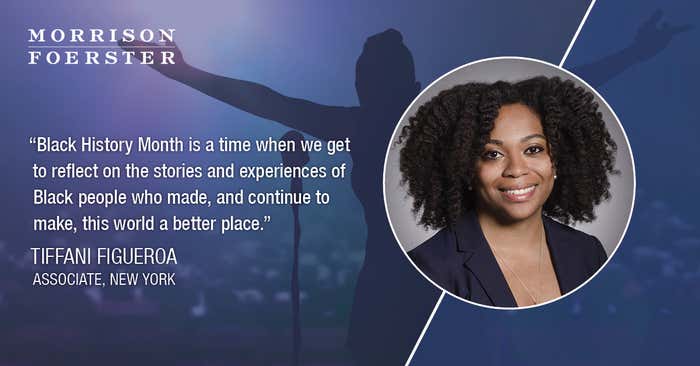
Editors’ Note: This month, in celebration of the pioneers who paved ─ and continue to pave ─ the way for civil rights and equality in America, we are featuring a Q&A miniseries with MoFo attorneys of color to discuss what Black History Month means to them.
Tiffani Figueroa is an associate in the Litigation Department of Morrison & Foerster’s New York office.
What does Black History Month mean to you?
Black History Month is a time when we get to reflect on the stories and experiences of Black people who made, and continue to make, this world a better place. Whether it’s learning about one of the first Black businesswomen, or those involved in the Civil Rights Movement, it’s a reminder of how we got to where we are today. Engaging in this learning process also provides an opportunity for us to empower young people as they think about the ways they can continue to bring about change for people of color, as there is still more work to be done. I also think this is a special time for members of the Black community to stop, take a moment, and be proud of all the beauty and strength of being Black.
Can you share a little about your career/journey? What has driven your success? What do you hope to achieve in the next 5–10 years?
I’ve wanted to be a lawyer since I was about seven years old. I tried to take advantage of every opportunity that got me closer to making this my career. For example, I applied to programs such as A Better Chance, which allowed me to attend a top high school through a community school boarding program, and set me on the path to get into Georgetown, then Hofstra Law, and then land at my home — MoFo. To date, I continue to try to take advantage of opportunities that will make me a better lawyer. Clerking, which was one of my top goals, is a recent example. It was the one thing Justice Sotomayor regretted not doing, so I knew it had to be a big deal. When the opportunity presented itself, I jumped on it. It didn’t matter that I wasn’t clerking directly after law school and that I had already practiced law for a couple of years. It was about developing as an attorney in a unique environment, being exposed to a wealth of different laws and lawyering styles, and gaining an invaluable experience. It was a chance for growth, which is important to me at every stage of my career.
I’ve always been driven to do my best and to make my family proud, especially as the first college grad and lawyer in my family. That meant, and continues to mean, putting in hard work. But that isn’t a problem for me. I get to do exactly what I thought I wanted to do as a seven-year-old and it turned out to be the right fit. So, in the next 5–10 years, I hope to continue on this path. I hope to continue practicing in Big Law, to further develop my skills as a litigator, to serve as a mentor for young professionals, and hopefully to add to the growing number of women of color in partnership positions.
What words of wisdom do you have for the next generation of aspiring black lawyers?
Follow through with what you want to do, even if there aren’t many people who look like you in that particular field. As one of my mentors once said: People of color need a seat at every table. And I truly believe that. That’s how we effect change. That’s how diversity of thought, experience, and emotion is put into action. And, that’s how you open the door for the next generation.